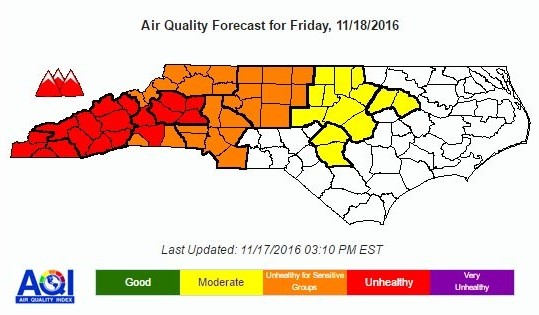The air quality forecast for Friday, November 18 is Code Red, or “Unhealthy” conditions.
All people should limit prolonged or heavy exertion outdoors. Children, older adults, active people, and those with heart disease or respiratory conditions (like asthma) may experience more serious health effects.
Air conditions may vary throughout the day and from one location to another within the county. Therefore, your own observations will be the best guide for determining how the smoke is affecting air quality in your immediate area. If you can see haze and smell smoke, then air quality is not good and you should limit your outdoor activities.
WHAT SHOULD I DO?
Check local air quality reports. Visit www.ncair.org for daily updates on air quality.  You can also use the following guide from the N.C. Division of Air Quality to estimate air pollution based on visibility ranges.
You can also use the following guide from the N.C. Division of Air Quality to estimate air pollution based on visibility ranges.
Limit physical activity. Increased physical activity requires people to breathe faster, breathe deeper, and take in more air—and therefore, more air pollution—into their lungs. You can reduce the amount of time you are breathing hard, take more frequent breaks, and reduce how hard you are working or exercising.
Stay inside and keep indoor air as clean as possible. Keep windows and doors closed. Run your HVAC system if you have one, but keep the fresh-air intake closed and the filter clean to prevent outdoor smoke from getting inside.
Avoid activities that increase pollution. Burning candles, fireplaces, or gas stoves can increase indoor pollution. Vacuuming stirs up particles already inside your home, contributing to indoor pollution. Smoking also puts even more pollution into the air.
Follow the advice of your doctor or other healthcare provider about medicines and your respiratory management plan if you have asthma or another lung disease. Consider evacuating the area if you are having trouble breathing. Call your healthcare provider for further advice if your symptoms worsen.
PLEASE NOTE: Filtering face masks will provide little if any protection and may offer the wearer a false sense of protection.
For people with heart and respiratory diseases, use can actually be dangerous and should not be worn without a doctor’s supervision. Respirators and masks can make the work of breathing more difficult, leading to increased breathing rates and heart rates.
An N95 respirator may filter some particles, but only works if it is properly fitted to the face. It should be used as a last resort after taking all actions above or if outdoor activity cannot be avoided.

